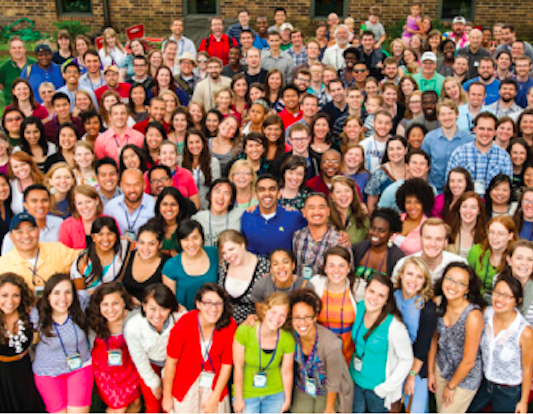InterVarsity Christian Fellowship (IVCF) has been “derecognized” by California State University (CSU) as a campus organization at all of the 23 schools in the state system.
According to Caleb Bonham, writing at Campus Reform, IVCF has been derecognized because the organization requires its leaders to hold Christian beliefs, and, therefore, is viewed as discriminatory.
The CSU system, which is the largest university system in the United States with 450,000 students, has reportedly refused to grant an exemption to IVCF from a 2012 anti-discrimination policy that requires all recognized student organizations to open its leadership positions to all students.
On its website, IVCF states its “chapter leaders are required to affirm InterVarsity’s Doctrinal Basis,” which essentially recognizes God as the Creator of all things who exists in three persons, the Father, Son, and Holy Spirit, and the Bible as having been divinely inspired.
“While we applaud inclusivity, we believe that faith-based communities like ours can only be led by people who clearly affirm historic Christian doctrine,” states IVCF. “The policy affects 23 chapters within the California State University system. The policy exempts sororities and fraternities from gender discrimination; we believe there should be a similar provision for creedal communities.”
The Christian group goes on to say that in August of 2013, new chancellor, Timothy White, granted religious groups a one-year exemption for the 2013-2014 school year, but has since affirmed that no further exemption will be made.
CSU’s policy states:
No campus shall recognize any fraternity, sorority, living group, honor society, or other student organization that discriminates on the basis of race, religion, national origin, ethnicity, color, age, gender, marital status, citizenship, sexual orientation, or disability. The prohibition on membership policies that discriminate on the basis of gender does not apply to social fraternities or sororities or other university living groups. Student organizations shall deliver to the vice president for student affairs or his/her designee a statement signed by the president or similar officer of the local student organization attesting that the organization has no rules or policies that discriminate on the basis of race, religion, national origin, ethnicity, color, age, gender, marital status, citizenship, sexual orientation, or disability. This statement shall be renewed annually.
However, Ed Stetzer, writing at Christianity Today, observed, “Following the same logic, any group that insists on requiring its leaders to follow an agreed upon set of guiding beliefs is no longer kosher (irony intended) at California’s state universities.”
“This will impact many other faith-based organizations with actual, well, faith-based beliefs,” Stetzer wrote. “Presumably, even People for the Ethical Treatment of Animals would have to allow Oscar Meyer to lead their campus chapters.”
Stetzer states that, of course, the university may argue it is not banning or persecuting Christians.
“People can share their faith,” he writes. “But, now, what we once called ‘equal access’ has taken another hit–people of faith do not have equal access to the university community, like the environmentalist club, the LGBT organization, or the chess club.”
Stetzer said Greg Jao, IVCF National Field Director & Campus Access Coordinator, told him that, specifically, “derecognition” means the group loses free access to university rooms, costing the organization’s chapters $13,000 to $30,000 per year to reserve rooms, access to student activities programs and student fairs, and stature when the group engages faculty, students and administrators.
Jao, however, said his organization is rebooting as it develops “a new style of campus ministry” that doesn’t “rely on established campus structures.”
A press release on the IVCF website notes:
InterVarsity Christian Fellowship is now developing a new style of campus ministry on CSU campuses where we have been banned from participating in campus life as a recognized student organization. In order to maintain a ministry presence with 23 chapters on 19 CSU campuses, InterVarsity is introducing creative new ways to connect with students and share the gospel message–though doing so as an “unrecognized” student group will prove considerably more costly.
Because we are no longer allowed to participate in campus organization fairs, InterVarsity will make contact with students by deploying new tools such as mobile banner stands, interactive displays, social media, and other techniques that don’t rely on established campus structures.
“Our campus access challenges give this generation of students an opportunity to reinvent campus ministry,” said Jao. “Even as we use new tools and techniques, we remind students that effective ministry is ultimately relational. It’s about students inviting other students to follow Jesus.”
IVCF observes that, during the last school year, 40,299 core students and faculty were actively involved with the Christian organization across the country–its highest participation rate ever.
“Approximately 50 percent of students active in our chapters are members of ethnic minority groups, in California the number is closer to 70 percent,” the press release states.
Stetzer, however, observes the big picture.
“The bigger, and ongoing, issue is the continual sanitization of unacceptable religious voices from universities,” writes Stetzer. “It’s ironic–those who champion nondiscrimination, in the name of nondiscrimination, are creating rules that push out those who ‘discriminate’ based on biblical belief statements.”

COMMENTS
Please let us know if you're having issues with commenting.